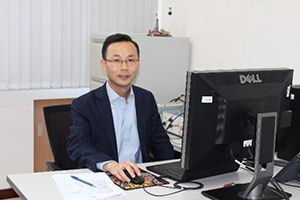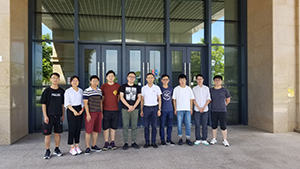As a public university with the most state key laboratories in the west of the Guangdong-Hong Kong-Macao Greater Bay Area, UM has attained research breakthroughs in science research. In response to the prevention and control work of novel coronavirus pneumonia of the Macao SAR governments, FST has for the first time conducted a research about disinfecting intelligent robots, aims to provide strong scientific and technological support to fight against the epidemic.
Breaking free from safe thinking: To explore the future of intelligent robots
Facing the threat of novel coronavirus pneumonia, the technology of disinfection has become one of the key technologies in virus elimination. However, as of today, many regions are still conducting disinfection manually, which leads to a heavy workload of front-line medical staff and high risk of spreading infection. Although there are a few disinfection robots available in the market, they are too costly to afford and difficult to be widely deployed. This research project is led by Prof. Xu QingSong of FST to develop an artificial intelligence robot for automatic disinfection and sterilization in response to the threat of novel coronavirus pneumonia. The artificial intelligence robot can replace manual disinfection with both indoor and outdoor automatic disinfection. As the robot can be remotely controlled with a mobile app, it will greatly prevent cross infection and reduce the risk of infection of medical staff. Laser radar, ultrasonic sensor and camera lens are used for the robot for real-time environmental ranging and sensing. With the autonomous navigation and obstacle avoidance functions, users can use the camera lens to monitor the status of disinfection. In addition, the robot can decide its own route, analyze the size of cleaning space, adjust and spray disinfectant with precise dosage. The robots adapts advanced dry fog hydrogen peroxide (hydrogen peroxide) to conduct disinfection due to the high bactericidal force of hydrogen peroxide and its fast volatile speed. Also, the security of hydrogen peroxide is much higher compared with bleach. The robot can help to save the use of disinfectants after the auto- calculation of disinfectants. It ensures 360° disinfection as the disinfectants penetrate in the small gaps that are difficult to reach during normal cleaning work.
Prof. Xu QingSong shared that the price of artificial intelligence robot today is still expensive until today. In order to offer a cost effective robot, the research team will try to reduce the cost of disinfecting intelligent robot as much as possible so that it could be widely adapted at high-risk areas such as hospital, schools and university. During this difficult time, the research and analysis of intelligent robots have rapidly developed, the application of intelligent robots has also increased, such as medicine delivery, food and water delivery, remote consultation and temperature screening inspection. Professor Xu expected that the research results can provide core technology support for the design, development and application of intelligent robots in the future.
Successfully achieved the Macau Science and Technology Development Fund (FDCT)
This project has successfully achieved the fund from Macau Science and Technology Development (FDCT). Only 26 projects were approved out of 74 applications. The funding period ranges from 6 to 12 months. Thanks to the support of the central and Macao SAR governments, the disinfecting intelligent robot project was made possible. Professor Xu said that the University of Macau provides superior equipment and the best talents, it is perfect for the development of smart robots in the future. He wished to gather local scientific power and resources to help to recover the society from the epidemic, contribute more to Macao, serve more for the society and build a better future.
作為粵港澳大灣區西岸擁有最多國家級科研單位的公立大學,澳門大學科研技術再有新突破。科技學院為了響應澳門特區政府對新型冠狀病毒肺炎的防控工作,首次進行了醫護抗疫智能機器人的研發,期望能夠為疫情提供有力的科技支撐,以創新的科研建立更美好的未來。
居危思變 — 探索智能機器人未來發展之路
面對新型冠狀病毒肺炎肆虐,消毒技術成為抑制病毒關鍵技術之一。但目前大多數地區仍然依賴人手作業消毒,導致前線醫護工作量大增且面臨具大的感染風險,雖然目前有少數消毒機器人供應,但價格偏高,難以大規模普及應用。是次研究項目是由科技學院教授徐青松帶領團隊進行研發,針對新型冠狀病毒肺炎疫情危機,研製一種人工智能機器人用於自動化消毒滅菌,可以代替目前人手消毒,實現室內室外自動消毒工作。由於可以用手機應用程式遠程控制機器人,投入使用後將可大幅降低醫護人員感染風險,避免交叉感染。設計採用雷射雷達、超聲波感測器以及攝像鏡頭等進行即時環境測距及傳感,具有自主導航以及避障等功能,用戶可以利用攝像鏡頭實況觀察消毒情況。此外,機器人可以自行規劃路線,自行分析空間大小,自行調節及噴灑精準劑量的消毒劑。設計更採用先進的乾霧過氧化氫(雙氧水) 消毒,雙氧水殺菌力高,揮發速度快,與漂白水等比較,雙氧水安全度更高。精準計算後噴出的霧氣除了可以節省消毒劑量之外,更可深入平常難以接觸的細微縫隙,真正地實現360°無死角自動消毒。
徐青松教授表示鑑於目前市面的消毒機器人價格較高,在不影響效果的前提下,他和研究團隊會盡量降低機器人的成本,以增加普及率,期望未來可以在醫院﹅學校等人多高風險地區投入使用。疫症下,除了更快地推動智慧機器人的研發外,也大大增加了智慧機器人的應用,如藥品配送、食物運送、遠程問診及體溫篩查巡檢等等。徐教授期望本次研究成果可為未來智慧機器人的設計、開發和應用普及提供核心技術支撐。
成功爭取澳門科學技術發展基金資助 (FDCT)為科研貢獻
此研究項目更成功爭取到澳門科學技術發展基金資助,74個申請中僅批出26個項目。資助期由6個月到12個月不等。是次智能消毒機器人研究得以成功啟動,有賴國家和澳門特區政府的支持。徐教授認為澳門大學提供優越的設備,優秀的人才,未來將會有更多的空間發展智慧機器人,期望能集合本地科研力量及資源協助疫症後社會復甦,以貢獻澳門、服務社會、構建美好未來。

Prof. Xu QingSong shared the research about disinfecting intelligent robot
徐青松教授分享消毒智能機器人研究

Prof. Xu QingSong and his research team
徐青松教授和他的研究團隊

